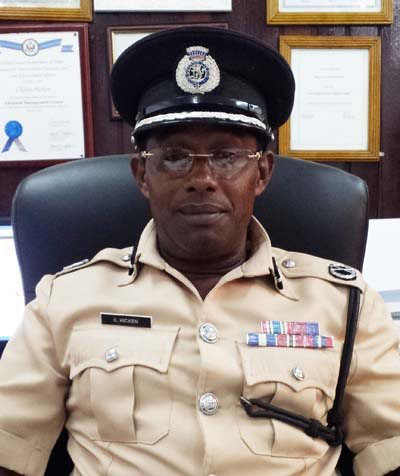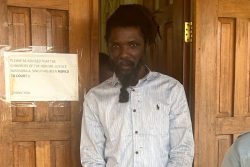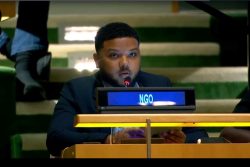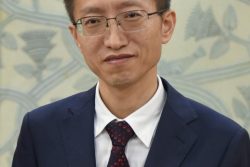Citing a number of errors which it is contending the Chief Justice made, the opposition APNU+AFC has filed an appeal to the ruling upholding the President’s appointment of Clifton Hicken to act as Commissioner of Police.
The opposition is of the view that the Chief Justice’s ruling “was against the weight of the evidence,” and has previously described it as “too grave to be left standing.”
Filed in the name of its Chief Whip Christopher Jones, the main opposition is arguing among other things that acting Chief Justice Roxane George SC erred in law when she held that the President was vested with the authority to make an acting appointment to the office of Commissioner of Police under Article 111 of the Constitution.
 In her ruling delivered last Thursday, Justice George declared Hicken’s appointment by President Irfaan Ali to have been lawful which she said the Head of State was entitled to do in his own deliberate judgment, under Article 111.
In her ruling delivered last Thursday, Justice George declared Hicken’s appointment by President Irfaan Ali to have been lawful which she said the Head of State was entitled to do in his own deliberate judgment, under Article 111.
Noting that there was no Opposition Leader at the time of the appointment, the Judge asserted there could likewise have been no consultation between the two political figureheads on making the appointment, as is required in Article 211 of the Constitution.
Against that background, the Judge said that notwithstanding the provisions of Article 211, it could not be the intention of the framers that without an Opposition Leader, the smooth functioning of the Guyana Police Force ought to be hindered without a Commissioner of Police; while adding that where consultation has not materialized due to no fault of the decision-maker, it does not mean that the decision-maker is precluded from acting.
On this point the Chief Justice had said that there being no Opposition Leader had nothing to do with the President, and for which he could also not be faulted.
Through its attorney Roysdale Forde SC who is also the APNU+AFC Shadow Attorney General and Minister of Legal Affairs, the opposition has expressed the view that the Chief Justice erred when she found that the President could have acted out of necessity and exercised his own deliberate judgement pursuant to Article 111, to make the appointment.
Justice George ruled that the absence of a Leader of the Opposition to meaningfully consult with, led to the necessity of the President making the appointment, which she described as being “reasonable…in his own deliberate judgment.”
She said that he was so entitled pursuant to Article 111 of the Constitution to address the “unexpected circumstances” with which he had been confronted and to also address the administrative deficiency that had arisen.
The Judge reasoned that there could have been a negative impact on national security if the highest office of such an important law enforcement agency was left vacant, given what at March 30th, 2022, when Hicken was appointed, was uncertainty about when an Opposition Leader would have been appointed.
The opposition also takes issue with the Chief Justice’s finding of there being no difference between “an appointment to act” in the office of the Commissioner of Police and “an appointment to perform” such functions.
The Appellant argues that the Judge erred and “misconstrued” Article 232 (2) of the Constitution in her finding that the terms were used interchangeably and not disjunctively.
On this point the opposition is of the view that the Chief Justice found herself in error by not properly directing her mind to subsection 2 which they argue provides that the terms therein would only be applicable “unless it was otherwise provided or required by the context.”
The opposition is arguing that in the circumstances of the case the Constitution did expressly otherwise provide or require by its context that the President’s power to appoint a person to the office of Commissioner of Police to act was conditional on meaningful consultation as required by Articles 211 and 232 of the Constitution.
To Forde’s argument in the original claim obliterating what he said was a “material distinction,” Justice George said that the distinction sought by Forde between an acting appointment grounded in meaningful consultation which could not be achieved, as against a performing-duties appointment “appears to be splitting hairs and making much ado about nothing.”
Against that background she had said that “act” and “perform the functions of” are interchangeable and amount to the appointment of a person to fill a position on what should be a temporary or holding situation.
She thus said that, whether appointed to act or to perform the functions would amount to the same thing—a person would be permitted to carry out the duties and responsibilities of the post.
The opposition is contending that the Chief Justice erred by disregarding and placing no weight or consideration to what it described “the express constitutional value and objective of meaningful consultation.”
Their view is that without compliance, no acting appointment could have been made; and moreover that the Judge’s conclusion of the acting appointment being a temporary one was improper since the President never himself gave any such indication.
The Chief Justice had said that the State’s defending affidavit disclosed that the appointment was meant to be temporary until an Opposition Leader was in place and a Police Service Commission appointed to then allow for compliance with Article 211.
Another ground on which the opposition is appealing is that the Chief Justice erred in failing to find and or consider that the circumstances of the case, particularly the removal of the very Police Service Commission (PSC) and what they said is the President’s consequent failure to appoint a PSC, substantially contributed to the state of affairs of the case.
Following the ruling, the opposition described the decision as being “strangely and eerily silent on the unilateral removal of the entire PSC,” by the President, but being “preoccupied’ with the impact and purport of the then vacancy in the office of the Leader of the Opposition.
Forde had said that this was done without any consideration that “the President failed to appoint the Police Service Commission for months, substantially contributing to the state of affairs” that led to the action being filed in the Court.
Chief Justice George had said that “ultimately, it is the President who must appoint the Commissioner of Police,” before stating that in the context of the Applicant’s case, it could not be that the President should be rendered incapable of appointing someone to act in or perform the functions of the office of Commissioner of Police, so as to ensure that the machinery of administration was not hindered.
The opposition is hoping to have the entire ruling overturned by the Guyana Court of Appeal.
Hicken and the Attorney General are the respondents
The Opposition’s original challenge was filed back in May by Jones, whose main contention was that the appointment was unreasonable and unlawful and that it violated Article 211.









